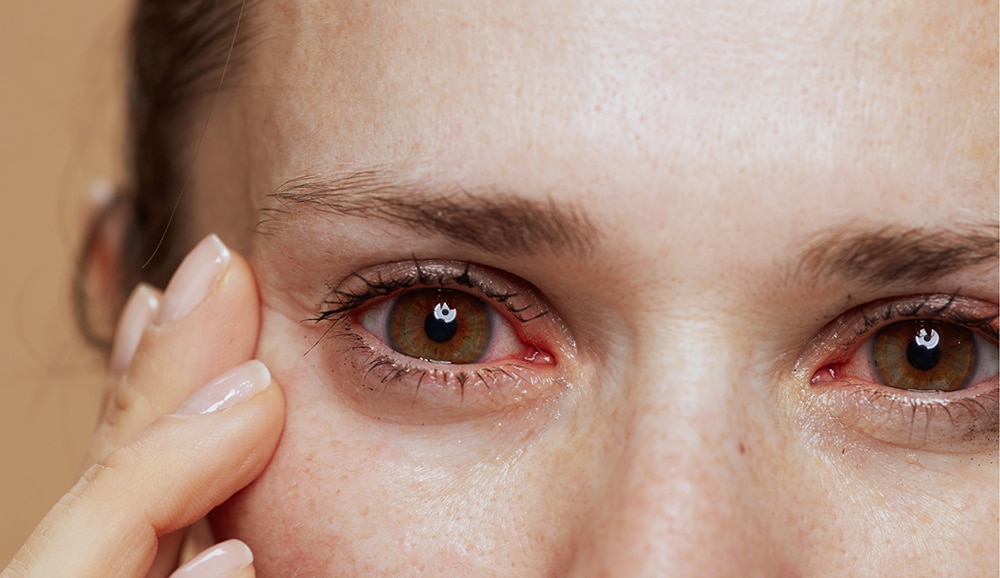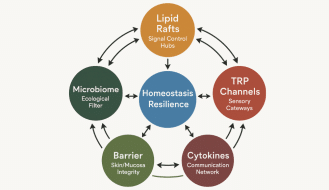7 Signs You Have an Omega-3 Deficiency
Despite living in an age of nutritional abundance, roughly 95% of Americans suffer from a silent epidemic: omega-3 deficiency.
This trend has far-reaching implications for public health but remains under the radar for many.
In this article, we’ll uncover the widespread deficiency of omega 3 fatty acids in the United States, how to know you have an omega-3 deficiency, and how you can make sure you get enough of these essential nutrients for optimal wellbeing.
Why Are Omega-3s So Important?
Omega-3 fatty acids are a group of nutrients that are vital for human health—from heart health to brain health and beyond. These fatty acids make up part of the cell membrane and play many important roles in the body.
Here are just some of the health benefits you can get from omega-3s:
• Reduce inflammation and support immune health. Many Americans today suffer from chronic, low-grade inflammation. This ongoing inflammation is not good for our bodies. It’s associated with aging and can lead to serious conditions like heart disease, cognitive disorders like Alzheimer’s, and even various types of cancer.
Omega-3s have anti-inflammatory properties and are one of the best nutritional tools for reducing inflammation. For example, omega-3s act as the substrates for resolving mediators or spms, called resolvins, protectins and maresins. These bioactive compounds resolve and protect against inflammation. They’re also involved in modulating the body’s immune response.
• Facilitate the exchange of nutrients across the cell membrane. Practically speaking, this ensures that the other nutrients, supplements and medications you take work well.
• Make our receptors more attuned to stimuli. This has major implications, especially for the brain. If our receptors aren’t working well, our cognitive health suffers.
• Impact which genes turn on and off (a.k.a. gene expression). We think about genes as something we’re born with and can’t change. However, our lifestyle choices influence how many of our genes express themselves throughout our lives. Notably, omega-3s activate the anti-inflammatory transcription factor NR1C3, which is yet another way that these fatty acids reduce inflammation in the body [1].
With all the roles they play in our cells, it’s no wonder omega-3s are vital for the healthy functioning of every organ in the body. Sadly though, most Americans do not get enough.

Why are so many people omega-3 deficient? Few foods in the typical American diet contain omega-3s.
Omega-3 Deficiency in the USA
In the USA, an estimated 95% of Americans have low omega-3 levels.
Why are the numbers so bad? Two simple reasons:
1. Not Enough Fish
There are many types of omega-3s, but the most important ones are called eicosapentaenoic acid (EPA) and docosahexaenoic acid (DHA). Eating foods rich in omega 3 fatty acids can help us maintain optimal levels of EPA and DHA. Unfortunately, there aren’t too many options beyond seafood. Of the foods we eat, EPA and DHA are most plentifully found in fatty fish, like salmon, sardines and mackerel. Few Americans maintain a balanced diet with the recommended 2 servings of fish per week – and even then, studies show more may be needed for optimal results [2].
What about plant-based omega-3s? Flaxseed, chia seeds and walnuts are sources of a different type of omega-3 called alpha-linolenic acid, or ALA. Plant oils with ALA are beneficial too. But ALA plays different physiological roles in our body than the EPA and DHA found in fish.
Our ancestors ate tons of fish because it was a cheap and readily available source of healthy proteins and fats. Our cells adapted to this dietary habit. That’s why our bodies and genes function best when getting enough EPA and DHA omega-3s.
2. Too Much Processed Foods
Highly processed foods typically contain large amounts of something called omega-6 fatty acids, which can cause adverse health effects. Simply put, omega-6s are pro-inflammatory. They compete against the anti-inflammatory omega-3s in the body.
Eating a typical American diet means you easily get 15 – 20 times more omega-6 than omega-3 [1, 3]. As a result, you constantly flood the body with inflammatory molecules. No wonder many Americans suffer from chronic inflammation, a key driver behind heart disease, Alzheimer’s disease, autoimmune diseases like rheumatoid arthritis and more.
How Do You Know You’re Not Getting Enough Omega-3s?
Many people have low omega-3 levels, but don’t know it. This includes folks with otherwise healthy diets and even many individuals who eat fish and are taking fish oil supplements.
The good news is that you can test your omega-3 levels. Taking an omega 3 index test, for instance, provides you with a measure of the amount of EPA and DHA in your red blood cells.
Besides testing, there are some common signs that may give you a clue you need to increase your omega-3 intake. The following are some common omega 3 deficiency symptoms:
Skin Issues
Omega-3s are structurally important to our skin. Our skin includes a layer of lipids, about 15% of which includes fatty acids [3].
When we don’t get enough omega-3s, skin health starts to suffer. The skin becomes dry, dull, and prone to greater sensitivity and irritation. Indeed, studies show that insufficient fatty acid levels can lead to skin problems, like dermatitis.
It’s worth remembering that most chronic skin issues start with or involve inflammation. Given the importance of omega-3s for reducing inflammation, it’s not surprising that studies indicate omega-3 benefits skin issues like atopic dermatitis and psoriasis.
Some studies even suggest omega-3s can help with acne. For example, a 2024 study found that eating a Mediterranean diet plus taking an omega-3 supplement significantly reduced skin lesions in people with mild to moderate acne. That may be because, in addition to reducing inflammation, these fatty acids also lower insulin-like growth factor (IGF)-1 levels, a key factor in acne. This reduction can lead to decreased sebum production and potentially less severe acne [3].
Increasing the level of omega-3s in acne patients may not solve the problem, but could be used as an adjunct to other treatments. Topical omega-3 creams, like Barristrong®, may also be a smart choice for people looking to get more relief in key skin problem spots.
Slow Wound Healing
Already a century ago, researchers documented the benefits of fish oil for treating burns and wounds. Unrefined fish oil would be applied directly to the skin. The fish oil seemed to not only speed up the wound closing, but also reduced the risk of infections.
Today, we know that chronic inflammation impairs our body’s ability to heal wounds. Furthermore, a long list of studies show that omega-3s reduce inflammation and increase the presence of infection fighter cells at the site of the wound [4].

Vital for eyes: Animal studies show DHA deprivation can impair retinal functioning.
Eye Issues
Omega-3s are also vital for good eye health. In fact, the omega-3 fatty acid DHA makes up about 50-70% of the fatty acids in the rod outer segments of the retina [5].
So what happens when we don’t get enough? Already in the 1970s, studies showed that DHA deprivation impaired the retinal functioning of rats and other animals [6].
Since then, studies have continued to link low omega-3 levels with a series of eye issues. These include:
• Glaucoma: Omega-3 deficiency is associated with poor retinal ganglion cell activity, which has implications for glaucoma. While getting more omega-3s isn’t going to solve glaucoma, the fatty acids may make the eyes less susceptible to intraocular pressure [7].
• Dry eye disease: Dry eye disease is a complex condition with many causes. However, in most cases, dry eyes are related to the poor functioning of the meibomian glands. These glands line the inner eyelids and supply our eyes with lubrication for our eyes. Omega-3s improve the quality of the fats in our tears and help prevent the meibomian glands from getting clogged. This in turn reduces tear evaporation and improves eye comfort.
• Macular degeneration: The research is less clear as to how omega-3s impact age-related macular degeneration. Some studies have found omega-3 benefits for AMD patients, others have not. However, we do know that people with AMD generally have lower levels of omega-3s in the retinal tissue of the eye, potentially pointing to a connection [8].
Given the importance of omega-3s for the eye, it’s not surprising most optometrists recommend these fatty acids to their patients.
Joint Pain and Stiffness
Another indication of not having enough omega-3s is chronic joint pain and stiffness.
Again, numerous joint issues, like osteoarthritis, are characterized by low grade chronic inflammation. This chronic inflammation doesn’t just cause joint pain and stiffness. It can also further degrade the cartilage and in some cases, even lead to muscle loss.
As noted above, one of the main roles of omega-3s is managing inflammation. Omega-3s help reduce the expression of pro-inflammatory cytokines. The body also uses omega-3s to create resolvins that may reduce arthritis severity and protect the cartilage [9].
There’s been a lot of research on how omega-3s impact rheumatoid arthritis and osteoarthritis patients. In recent years, studies have also demonstrated that omega-3s may reduce joint discomfort post exercise.

Feeling creaky? Research shows getting enough omega-3s can be helpful for different types of joint troubles.
High Triglyceride Levels
If your triglyceride levels are high, chances are your omega-3 levels are low. Why does it matter? High triglycerides contribute to what’s known as arteriosclerosis (or the hardening and thickening of the arteries and artery walls). Arteriosclerosis puts you at an increased risk of stroke, heart attack, and cardiovascular disease.
The most consistent finding in omega-3 research is that taking high doses of omega-3s will drop your triglyceride levels. How much they drop depends on how much omega-3 you consume.
On average, taking between 3000 – 4000 mg of EPA/DHA will drop triglyceride levels by 25%. However, here at Omega3 Innovations, we frequently see those numbers reduce by even more when people take Omega Cure® Extra Strength.
Mood Swings & Mental Health
According to a 2023 Census Bureau survey, 50% of adults between the ages of 18 – 24 report experiencing anxiety and depression symptoms. Numerous factors such as social media influence, academic pressures, and uncertainties about the future assuredly contribute to this mental health crisis. However, low omega-3 levels may also play a role.
Studies show that young adults with low omega-3 levels have an increased risk of experiencing a psychotic episode or having a psychotic disorder [10].
Why would omega-3s help with mental health issues? Unbeknownst to many, inflammation plays a part in many psychiatric disorders. Depression, for example, is characterized by chronic low-grade inflammation. Indeed, scientists have shown that inflammatory cytokines can induce depressive-like symptoms [11].
Omega-3s support brain health by enhancing cell membrane fluidity and reducing inflammation. This can explain why studies show that taking omega-3 supplements may reduce aggression – up to 30%, by some estimates. Some researchers have also found that omega-3s can help make antidepressants and other therapies more effective [12, 13].
Cognitive Decline & Memory Problems
The brain is highly enriched with omega-3s. In fact, about 40% of the polyunsaturated fatty acids in the brain are made up of DHA [14].
In the brain, DHA promotes and sustains the growth of nervous system cells. It also assists with neurotransmission, neurogenesis, and synaptic plasticity. That’s precisely why DHA is vital for normal brain development, memory, problem solving skills, and focus.
Epidemiological studies consistently link low levels of omega-3s, especially DHA, with a higher risk of cognitive decline and dementia. Low omega-3 intake is also linked with mild cognitive impairment and memory loss [15].
On the flip side, higher omega-3 levels correlates with higher total brain volume and a larger hippocampus. That’s important since brain volume atrophy (particularly of the hippocampus areas) is a sign of Alzheimer’s disease progression [16].

How much omega-3? Studies show it typically takes at least 3 servings of fish weekly plus an omega-3 supplement to reach a desirable omega-3 index level.
Correcting Your Omega-3 Deficiency
If you think you’re not getting enough omega-3s, you can correct it. It just takes some mindfulness and research. Here are a few tips to get you going:
1. Eat more fatty fish. Specifically, eat more salmon, sardines, mackerel and herring, which have the highest omega-3 content. Shrimp and different white fish, like cod or tilapia, don’t deliver nearly as much EPA and DHA.
2. Find a liquid fish oil supplement. Even if you eat fish regularly, you may struggle to reach an optimal omega-3 level by eating fish alone. According to a 2019 study, it takes at least 3 servings of fish weekly plus an omega-3 supplement to reach a desirable omega-3 index level.
If you don’t eat much fish, getting a high dose of liquid fish oil is the way to go. Liquid fish oils and cod liver oils provide more omega-3s per serving and seem to afford more benefits than capsules. For example, Omega Cure Extra Strength delivers 3000 mg of EPA and DHA in a single serving. This is enough to cover most Americans’ omega-3 needs on its own and provide measurable benefits.
3. Cut back on processed foods. The more processed foods you eat, the more you flood your body with pro-inflammatory omega-6s. This means you’ll need even more omega-3s to combat them. Especially avoid foods that contain lots of corn oil, soybean oil, and sunflower oil. That means saying no to chips, fried foods, and prepackaged meals.
4. Measure your omega-3 levels. After you’ve worked to increase your omega-3 intake, it’s smart to measure your omega-3 levels to make sure you are on the right track. This is true even when you supplement with omega-3s. In fact, one survey of omega-3 supplement users found that 4 out of 5 people still had low levels, likely due to the low EPA and DHA doses in many fish oil capsules. The omega-3 index test measures your intake over the last 4 months, so it’s good to repeat any time you change your diet.
Key Points:
Getting enough omega-3s isn’t a cure-all. But these fatty acids are important for the healthy functioning of every cell and organ in your body.
To achieve a healthy omega-3 level, many Americans need a high quality fish oil supplement rich in essential fatty acids. If you’re looking for one that provides a full EPA/DHA dose to cover your needs, discover Omega Cure Extra Strength. Each serving provides an effective dose of fresh, full-spectrum omega-3s for powerful results.
An Effective Omega-3 Dose, Made Simple
Experience the Omega3 Innovations difference for yourself with the most effective fish oil supplement on the market.
Buy Now
- Calder P. C. (2013). Omega-3 Polyunsaturated Fatty Acids and Inflammatory Processes: Nutrition or Pharmacology? British Journal of Clinical Pharmacology, 75(3), 645–662. https://doi.org/10.1111/j.1365-2125.2012.04374.x
- Jackson, K. H., Polreis, J. M., Tintle, N. L., Kris-Etherton, P. M., & Harris, W. S. (2019). Association of Reported Fish Intake and Supplementation Status with the Omega-3 Index. Prostaglandins, Leukotrienes, and Essential Fatty Acids, 142, 4–10. https://doi.org/10.1016/j.plefa.2019.01.002
- Balić, A., Vlašić, D., Žužul, K., Marinović, B., & Bukvić Mokos, Z. (2020). Omega-3 Versus Omega-6 Polyunsaturated Fatty Acids in the Prevention and Treatment of Inflammatory Skin Diseases. International Journal of Molecular Sciences, 21(3), 741. https://doi.org/10.3390/ijms21030741’
- Ontoria-Oviedo, I. et al. (2022). Topical Administration of a Marine Oil Rich in Pro-Resolving Lipid Mediators Accelerates Wound Healing in Diabetic db/db Mice through Angiogenesis and Macrophage Polarization. International Journal of Molecular Sciences, 23(17), 9918. https://doi.org/10.3390/ijms23179918
- Calder, P. (2018). Very Long-Chain N-3 Fatty Acids and Human Health: Fact, Fiction and the Future. Proceedings of the Nutrition Society, 77(1), 52-72. https://doi.org/10.1017/S0029665117003950
- Swinkels, D. & Baes, M. (2023). The Essential Role of Docosahexaenoic Acid and Its Derivatives for Retinal Integrity. Pharmacology & Therapeutics, 247. https://doi.org/10.1016/j.pharmthera.2023.108440.
- Nguyen, C. T., Vingrys, A. J., & Bui, B. V. (2013). Dietary ω-3 Deficiency and IOP Insult Are Additive Risk Factors for Ganglion Cell Dysfunction. Journal of Glaucoma, 22(4), 269–277. https://doi.org/10.1097/IJG.0b013e318237cac7
- Agrón, E. et al. (2021). Dietary Nutrient Intake and Progression to Late Age-Related Macular Degeneration in the Age-Related Eye Disease Studies 1 and 2. Ophthalmology, 128(3), 425–442. https://doi.org/10.1016/j.ophtha.2020.08.018
- Cordingley, D. M., & Cornish, S. M. (2022). Omega-3 Fatty Acids for the Management of Osteoarthritis: A Narrative Review. Nutrients, 14(16), 3362. https://doi.org/10.3390/nu14163362
- Mongan, D. et al. (2024). Longitudinal Trajectories of Plasma Polyunsaturated Fatty Acids and Associations with Psychosis Spectrum Outcomes in Early Adulthood. Biological Psychiatry, S0006-3223(24)01229-0. https://doi.org/10.1016/j.biopsych.2024.04.004
- Berk, M. et al. (2013). So Depression Is an Inflammatory Disease, But Where Does the Inflammation Come From? BMC Medicine, 11, 200. https://doi.org/10.1186/1741-7015-11-200
- Mehdi, S. et al. (2023). Omega-3 Fatty Acids Supplementation in the Treatment of Depression: An Observational Study. Journal of Personalized Medicine, 13(2), 224. https://doi.org/10.3390/jpm13020224
- Lam, C., Han, L., McIntyre, R. S., Teopiz, K. M., & Cao, B. (2024). Comparative Efficacy of Omega-3 Fatty Acid with Other Interventions for Depression in Children and Adolescents: A Systematic Review and Network Meta-Analysis. Journal of Child and Adolescent Psychopharmacology, 10.1089/cap.2024.0017. https://doi.org/10.1089/cap.2024.0017
- Zhang, X. et al. (2024). Effects of DHA on Cognitive Dysfunction in Aging and Alzheimer’s Disease: The Mediating roles of ApoE. Progress in Lipid Research, 93. https://doi.org/10.1016/j.plipres.2023.101256
- Mustafa Khalid, N., Haron, H., Shahar, S., & Fenech, M. (2022). Current Evidence on the Association of Micronutrient Malnutrition with Mild Cognitive Impairment, Frailty, and Cognitive Frailty among Older Adults: A Scoping Review. International Journal of Environmental Research and Public Health, 19(23), 15722. https://doi.org/10.3390/ijerph192315722
- Pottala, J. V., Yaffe, K., Robinson, J. G., Espeland, M. A., Wallace, R., & Harris, W. S. (2014). Higher RBC EPA + DHA Corresponds with Larger Total Brain and Hippocampal Volumes: WHIMS-MRI study. Neurology, 82(5), 435–442.
Popular posts



Related posts







